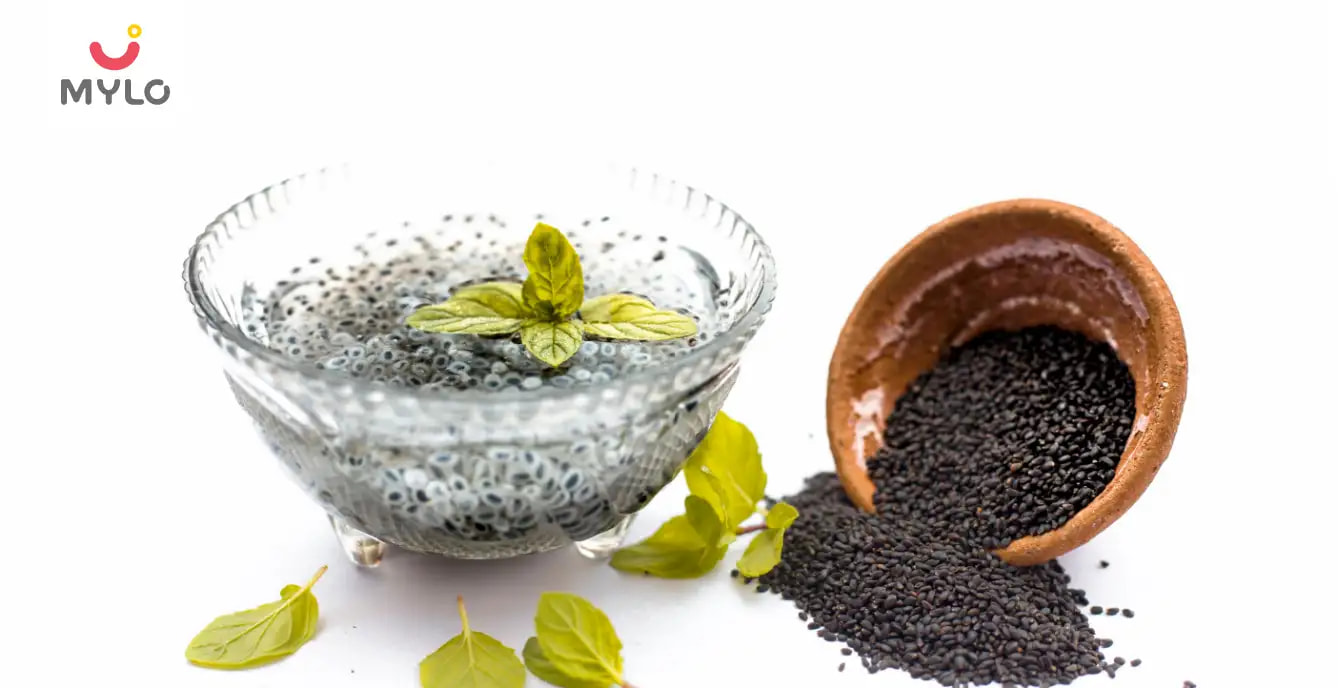Get MYLO APP
Install Mylo app Now and unlock new features
💰 Extra 20% OFF on 1st purchase
🥗 Get Diet Chart for your little one
📈 Track your baby’s growth
👩⚕️ Get daily tips

OR


Article Continues below advertisement
- Home

- Diet & Nutrition

- Sabja Seeds During Pregnancy: Benefits & Side Effects
In this Article
- What are Basil/Sabja Seeds?
- Nutritional Value of Sabja Seeds
- Is it Safe to Consume Basil Seeds in Pregnancy?
- Benefits of Sabja Seeds During Pregnancy
- 1. Blood Sugar Control
- 2. Curb Constipation
- 3. Relief from Acidity
- 4. Instant Coolant
- Side Effects of Sabja Seeds During Pregnancy
- Frequently Asked Questions
- 1. Does eating basil seed affect the fetus?
- 2. In terms of pregnancy, are sabja seeds hot or cold?
- 3. Are basil seeds beneficial during menstruation?
- 4. Does sabja seeds cause infertility?
- Closing Thoughts
- References
Diet & Nutrition
 28001
28001Sabja Seeds During Pregnancy: Benefits & Side Effects
Updated on 9 November 2023
The difficulty of being pregnant becomes all the more prominent when deciding what to eat and what not to eat. The abundance of well-intentioned advice and age-old traditions can make taking a balanced diet all the more confusing. However, some research goes a long way in determining what is best for mamas-to-be. In this article, we will put under microscopic scrutiny one such accompaniments of culinary items in India, basil seeds or sabja seeds, and examine how safe are sabja seeds during pregnancy.
What are Basil/Sabja Seeds?
Basil seeds, alternatively known as sabja seeds or tukmaria seeds, have been an integral part of Ayurvedic and Chinese medicines. They are indigenous to the tropical regions of Africa and Asia. Basil seeds closely resemble sesame seeds in appearance, but the former is black. Sabja seeds are usually extracted from sweet basil, which is the plant most commonly used to season foods. Basil seeds cannot be eaten raw, as they are very hard to chew. Instead, they must be soaked in water for at least 15 minutes, after which the seeds produce a gelatinous mass.
Nutritional Value of Sabja Seeds
Before deciding whether sabja seeds are safe or not during pregnnacy, it's important to understand their nutritional value. Mentioned below is the nutritional value for every 100 grams of sabja seeds:
Article continues below advertisment
|
Calories |
23 |
|
Carbohydrates |
2.65 grams |
|
Dietary Fibre Article continues below advertisment |
3.9 grams |
|
Calcium |
177 mg |
|
Potassium |
462 mg Article continues below advertisment |
|
Iron |
3.17 mg |
|
Total Fat |
0.64 grams |
|
Sodium Article continues below advertisment |
4 mg |
|
Sugar |
0.3 grams |
|
Folate |
68 ug Article continues below advertisment |
|
Vitamin B6 |
0.155 mg |
|
Riboflavin |
0.076 mg |
|
Water Article continues below advertisment |
92.1 grams |
You may also like: Chia Seeds During Pregnancy: Is It Safe?
Is it Safe to Consume Basil Seeds in Pregnancy?
Although basil seeds are packed with important nutrients, their consumption is not usually recommended during pregnancy. The consensus among the medical community is that basil seeds can decrease the body's estrogen levels, which is a pivotal hormone during pregnancy. The role of estrogen is to assist in the formation of vessels in the fetus and transfer nutrients to the baby. Thus, decreased estrogen levels can hamper the baby's growth and development.
Furthermore, taking sabja seeds before a C-section delivery may cause excessive blood loss because basil seeds or supplements are known to thin the blood and slow the blood clotting process. Few animal studies show that holy basil supplements may negatively affect sperm and trigger contractions in pregnancy. Thus, it is best to avoid excessive consumption of basil seeds if you are trying to get pregnant or are pregnant.
Benefits of Sabja Seeds During Pregnancy
Doctors recommend taking basil seeds in trace quantities, not more than two teaspoons occasionally. Some of the potential sabja seeds during pregnancy benefits include the following:
Article continues below advertisment
1. Blood Sugar Control
Sabja seeds or basil seeds can be a saviour for pregnant women with type 2 diabetes. Consuming basil seeds before meals can prevent the spike in blood sugar levels.
2. Curb Constipation
Needless to say, constipation is a common problem during pregnancy; however, basil seeds can act as a natural remedy. Sabja seeds are high in dietary fibre, which may relieve constipation. Furthermore, some studies show that consuming basil seeds, which are rich in fibre, can also contribute to healthy gut microbiota.
3. Relief from Acidity
Another problem that plagues pregnant women is acidity and heartburn. Sabja seeds are renowned for their cooling effect and may provide instant soothing benefits to the stomach's lining and reduce burning sensations.
4. Instant Coolant
Since time immemorial, sabja seeds have been used in Ayurvedic and other alternative medicine to pacify the stomach and body heat. Thus, occasionally drinking a basil seed smoothie or falooda can provide relief from the scorching heat if you are pregnant during summer.
You may also like: Fennel Seeds During Pregnancy: Benefits, Risks & Nutritional Value
Article continues below advertisment
Side Effects of Sabja Seeds During Pregnancy
Despite their manifold health benefits, basil seeds and related supplements may adversely affect pregnant women. Some of its side effects for mamas-to-be are:
- Basil seeds may cause uterine contractions and thus are not recommended during the first trimester of pregnancy as they may cause miscarriage.
- As basil seeds are high in fibre, excessive consumption may cause diarrhoea or abdominal cramps.
- Basil seeds may slow down blood clotting and promote blood thinning. Thus, you must stop their consumption two weeks before your planned Cesarean delivery.
- Lastly, sabja seeds may tamper with the estrogen levels of pregnant women, potentially harming the fetus development.
Thus, the key is in moderation when it comes to taking basil seeds in pregnancy. But, it is always optimal to consult your OBGYN regarding the do's and don't's of taking basil seeds.
You may also like: Flaxseed in Pregnancy: Is It Safe To Consume During Pregnancy
Frequently Asked Questions
1. Does eating basil seed affect the fetus?
Ans. Consuming basil seeds or sabja seeds during pregnancy may reduce estrogen levels. Estrogen is an integral hormone that helps form blood vessels in the fetus and transfers nutrients from mother to child. Reduction in estrogen can detrimentally affect the unborn child.
2. In terms of pregnancy, are sabja seeds hot or cold?
Ans. In terms of pregnancy, sabja seeds are cold and can provide relief from body heat and heartburn during pregnancy.
Article continues below advertisment
3. Are basil seeds beneficial during menstruation?
Ans. Basil seeds may improve the regularity of menstruation while reducing cramps.
4. Does sabja seeds cause infertility?
Ans. While sabja seeds/basil seeds are highly beneficial, overconsumption of sabja seeds may lead to infertility in men. They should not be consumed more than the recommended limits.
Closing Thoughts
In conclusion, sabja seeds during pregnancy can offer a wide range of benefits for pregnant women. From reducing blood sugar levels to improving digestion and reducing stress and anxiety, these seeds can be a great addition to a healthy pregnancy diet. However, it is important to consume them in moderation and under the guidance of a healthcare professional to avoid any potential side effects. Overall, consuming basil seeds in pregnancy can ensure the well-being of both the mother and baby as long as consumed in moderation.
References
1. Calderón Bravo H, Vera Céspedes N, Zura-Bravo L, Muñoz LA. (2021). Basil Seeds as a Novel Food, Source of Nutrients and Functional Ingredients with Beneficial Properties: A Review. Foods.
Article continues below advertisment
Tags
Sabja Seeds During Pregnancy in Hindi, Sabja Seeds During Pregnancy in Tamil, Sabja Seeds During Pregnancy in Telugu, Sabja Seeds During Pregnancy in Bengali



Written by
sakshi prasad
Get baby's diet chart, and growth tips

Related Articles
RECENTLY PUBLISHED ARTICLES
our most recent articles
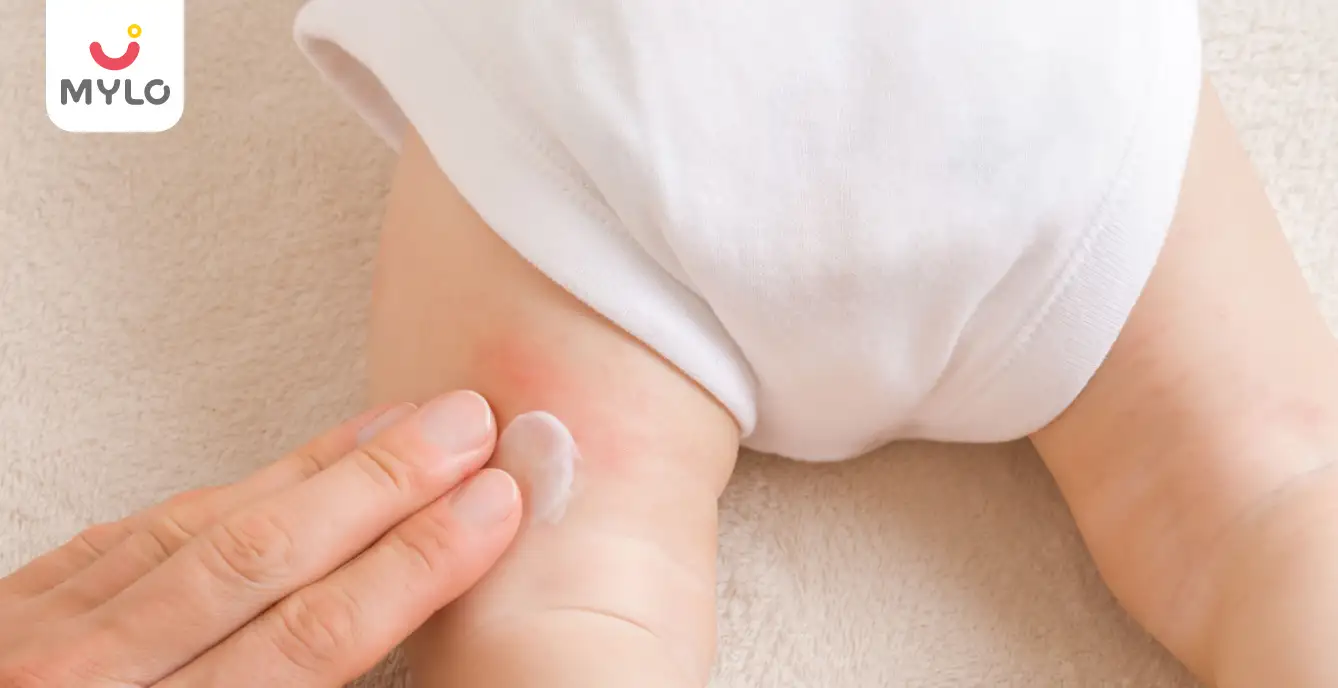
Rashes
Newborn Diaper Rash: Causes, Treatment and Prevention Tips
(113 Views)
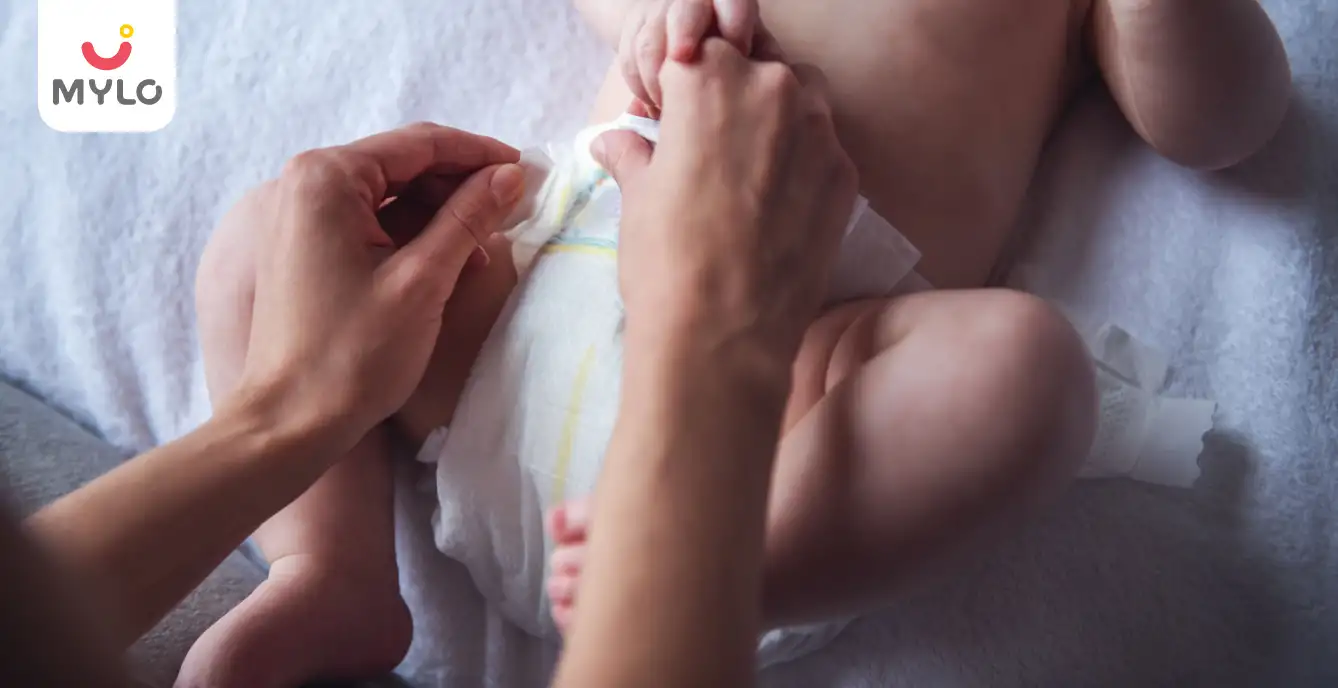
Diapering
New Born Baby Diapers: Understanding the Quantity and Sizing Needs of Your Little One
(237 Views)
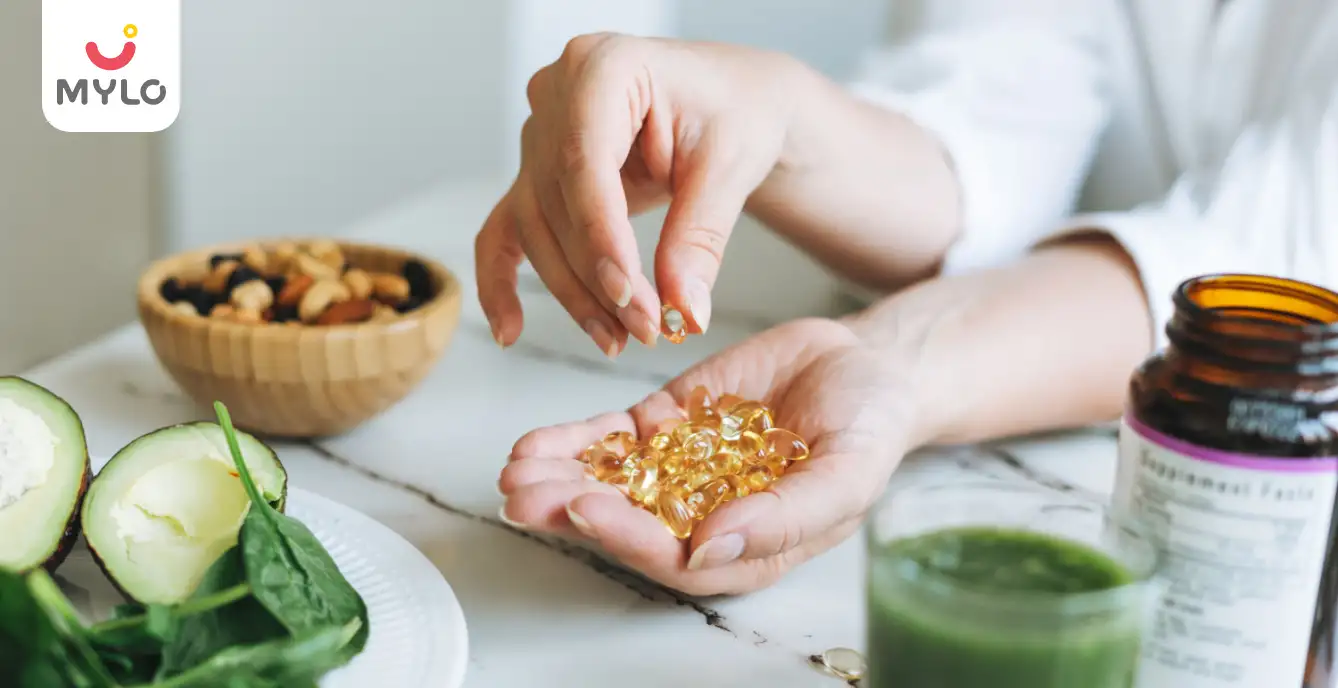
PCOS & PCOD
The Ultimate Guide to Supplementing with Omega 3 for PCOS
(1,887 Views)

Exercise & Fitness
The Ultimate Guide to Safe and Effective Exercise in Periods
(638 Views)

PCOS & PCOD
PCOS Hair Growth: Causes, Symptoms, and Effective Treatment Options
(197 Views)
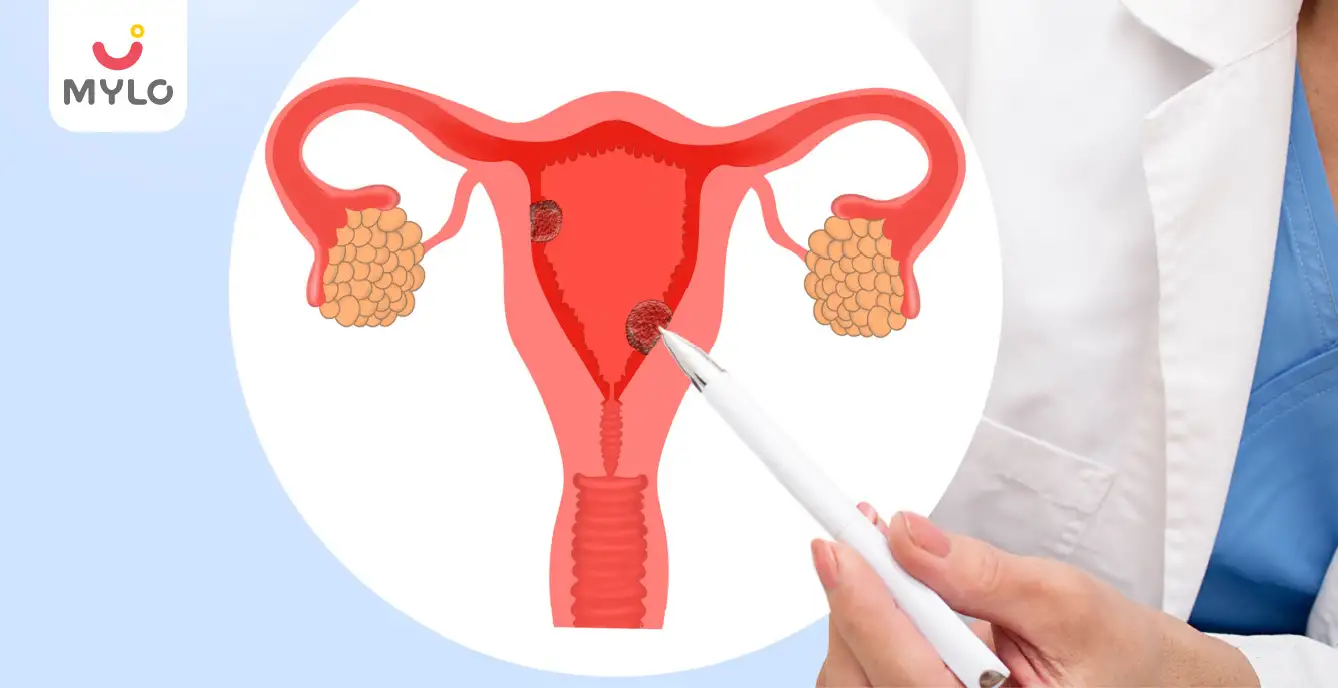
Women Specific Issues
Endometrial Hyperplasia: The Ultimate Guide to Understanding Its Causes and Treatment
(446 Views)
- Lights, Camera, Baby Bump: Movies to Watch During Pregnancy
- Squat During Pregnancy Benefits & Precautions
- The Ultimate Guide to Thyroid Treatment in Ayurveda
- Ayurvedic Treatment for Acne: Holistic Healing for Clear Skin
- Gokshuradi Guggulu: Ayurveda's Solution for UTI and Kidney Support
- The Surprising Benefits of Dark Chocolate for Periods
- How to Reduce Air Pollution in Your Daily Life
- Normal Prolactin Levels to Get Pregnant: What You Need to Know
- What Causes Low HCG Levels in Early Pregnancy & How to Increase It?
- Top 10 Babymoon Destinations in India for Expecting Parents
- Understanding the Reasons & Solutions for a Baby Not Eating Food
- The Ultimate Guide on How to Delay Periods Naturally
- গর্ভাবস্থায় আলুবোখরা: উপকারিতা ও ঝুঁকি | Prunes During Pregnancy: Benefits & Risks in Bengali
- গর্ভাবস্থায় হিং | ঝুঁকি, সুবিধা এবং অন্যান্য চিকিৎসা | Hing During Pregnancy | Risks, Benefits & Other Treatments in Bengali


AWARDS AND RECOGNITION
Mylo wins Forbes D2C Disruptor award
Mylo wins The Economic Times Promising Brands 2022
AS SEEN IN
















At Mylo, we help young parents raise happy and healthy families with our innovative new-age solutions:
- Mylo Care: Effective and science-backed personal care and wellness solutions for a joyful you.
- Mylo Baby: Science-backed, gentle and effective personal care & hygiene range for your little one.
- Mylo Community: Trusted and empathetic community of 10mn+ parents and experts.
Product Categories
baby carrier | baby soap | baby wipes | stretch marks cream | baby cream | baby shampoo | baby massage oil | baby hair oil | stretch marks oil | baby body wash | baby powder | baby lotion | diaper rash cream | newborn diapers | teether | baby kajal | baby diapers | cloth diapers |



